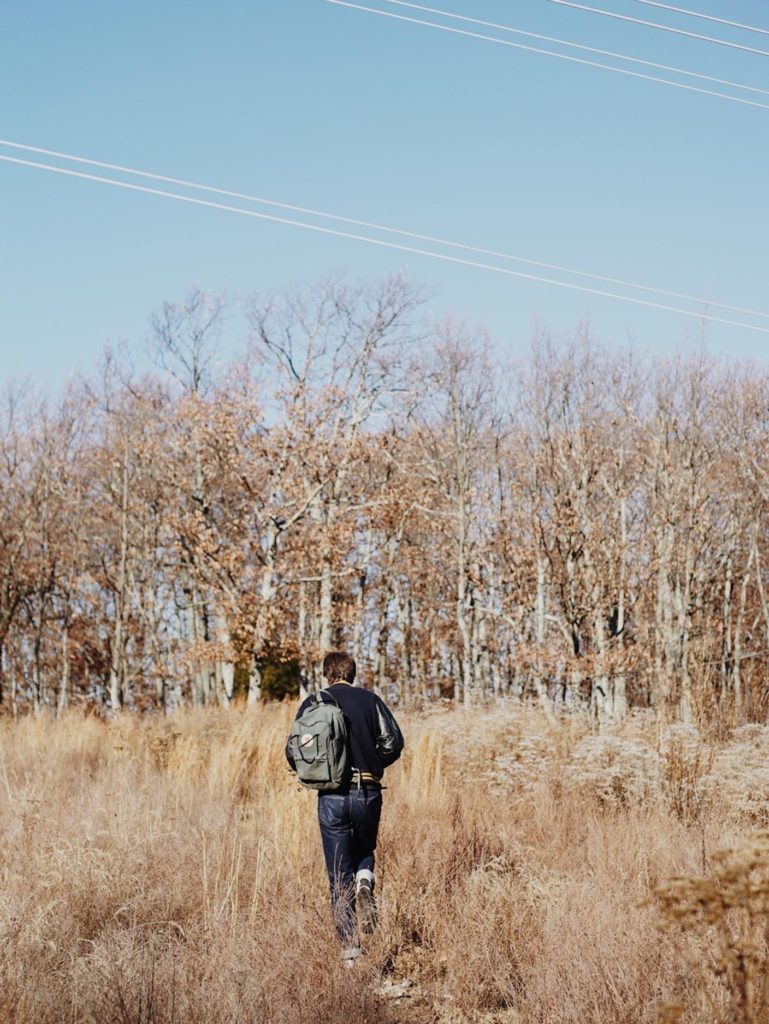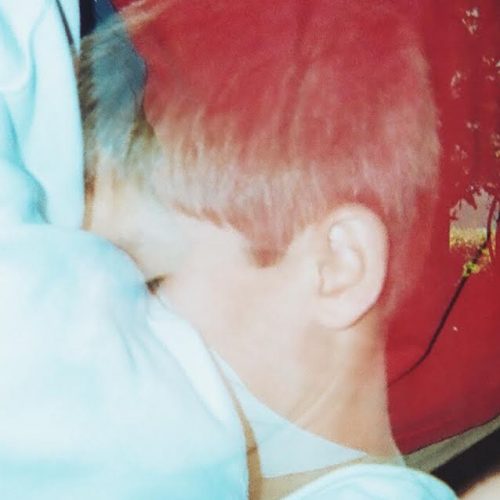Maxx Marshall’s song about gardening grew into something unexpected.
Let’s begin by asking: how many songs do you know about gardening? If your answer is more than zero, congratulations. You’re a John Denver fan, aren’t you?
Maxx Marshall, by his own admission, lives nowhere near a garden. But there was something about the work of gardening – the seasons, the growth, and the cycles of beauty – that spoke to him. So, as Maxx is prone to do, he started writing about it.
For Maxx, that’s where things begin – with words. It’s true that Maxx’s music invites a broad swath of audio indie descriptors. It’s folksy; it’s ambient; it’s Bon-Iver-esque; it’s even a bit otherworldly (as his favorite term connotes). For all of its sonic qualities, though his music is perhaps most defined by its lyrical quality.
It’s literary.
Maxx has a writer’s eye for the people and places around him, and he uses his literary background to choose phrases with the intentional precision of a craftsman. He’s a poet first, and a songwriter by consequence. Given that, maybe it’s less of a surprise that gardens would be a topic of choice for Maxx. From a poetic perspective, gardens are a rich subject. Poets from Dickinson to Kipling have turned to them for inspiration.
But, come on – a song called “Horticulture”? Still seems unlikely. It seems even more unlikely that a song about gardening would connect with anyone outside of the crowd at your local farmer’s market.
But the song does. On Spotify, the track was added to a Fresh Finds playlist, where it got plays alongside other, more conventionally-named tracks – and it’s all the better for being unexpected.
So, if you answered “zero” to our question about gardening songs, here’s what you need to do: even if you’ve never gotten into poetry, or gardening, or poems about gardening, give “Horticulture” a few listens.
I know this is the easy way out, but it’s the truth: I think it’ll grow on you.
It was a lot of fun getting Maxx’s take on his songwriting process, and getting to dig into the story of “Horticulture”. Enjoy the interview below, and be sure to give Maxx a listen and a follow at the links included below. And keep an eye out: word on the street is that a full-length album is in the works.
How’d you get into playing music and writing songs?
Marshall: I always did music performance – I played piano for a long time. I was involved in theater, choirs, performance-y things like that. And then, in high school… Well, it was just a very high-school-ish, emotional time. I got into more poetry writing. I had an English teacher who encouraged me in that. That’s what really helped me to develop my framework. I thought, “I write these words sometimes, I play guitar sometimes. Maybe I should put them together.”
When did you pick up guitar?
Not until high school. I mean, I’d actually “picked up” guitars, but I didn’t really start playing until sophomore year when I began borrowing my little sister’s guitar. It wasn’t mine; it was definitively hers. But that’s when I picked it up.
What were your first songs like?
They were all very sad. I don’t know if I really was or wasn’t as sad as I sound in my old songs. It’s funny; there would be stuff about feeling too old, which is kind of ridiculous, since I was a sophomore in high school. A lot of it’s in the vault now, but at this point I actually enjoy looking back at it.
I think that it was very important for me to write then. Every now and then I’ll dip back to some of it and say, “Maybe this song wasn’t very good, but there’s something about this theme or melody.” It’s helpful to regress back sometimes, and to see what words and ideas triggered emotions when I was younger. Even if maybe I don’t dig it today, there was a reason I wrote it down then, so it’s still neat to play with.
Why do you write songs?
That’s a tricky one. I think that a lot of times (and this is something that I keep learning), the reason I write a song is different from what I’d thought it was initially. Even if I go in thinking I’m writing it for a friend or for a particular reason, I’ll come out of it saying, “Wow, that was really just for me.”
I’ve also written songs that are to help me pray – that’s what they’re there for. There’s a plurality to it – it’s hard to whittle down songwriting to a single reason.
Do you write more often for yourself or for others?
The best songs that I write tend to be a convergence of those perspectives. I
think that it’s within a kind of personal digging that you get something that reaches someone else – often in a way that impersonal digging wouldn’t.
Maybe that’s a cheap answer, but that’s what I’ve found.
What do you think makes a song good?
I think I’d start by thinking about why I love the songs that I do. One of my all time favorite songs is I Can’t Make You Love Me by Bonnie Raitt. It’s really a very simple song when you look at the writing of it. Sometimes that’s frustrating for me, because I like to go into a weird language world where I think, “How many syllables can I rhyme?”
That’s not a bad thing, but a song like I Can’t Make You Love Me hits in such a personal way by being so simple – and that means that it can really reach a wide human audience. The verses are just super simple, super memorable, and very, very impactful.
I guess the biggest thing, to your question, is that I’m not sure. That’s one of the cool things about writing songs. I get to look into the songs I’ve written and figure out what I like. I think that if I claimed to have an answer, I’d probably be wrong. Or I’d be top of the charts [Laughs]– but more likely I’d just be wrong.
Are your favorite songs that you’ve written the songs that resonate the most with others?
Right now, it’s can be hard for me to gauge the answer to that. A lot of times the people that most compliment my music are the people who best know the story and the details behind the song – outside of just the melody and the words. I think I’m more often able to tell when something I’ve written is bad – both to myself and others.
So I guess it’s pretty tricky. Sometimes a lot of people get excited about a song, and I’m like, “Woah, I didn’t expect this to resonate so much with people. There’s definitely something here that’s a little bit bigger than I thought it was.”
Who are your influences?
Bon Iver. I love his new album so much. I listened to it an obsessive amount this year. It was to the point where I was finding myself just thinking his melodies when I’d go to write. I’d think, “Dang it, Maxx. You’ve saturated yourself too much.”
Dry the River. They’re not together anymore, but they had some of the most incredible lyrics.
Leonard Cohen. I love that he was a poet first, and a songwriter second. I’m nowhere near the poetical merit of Leonard Cohen, but that’s how I like to step into songwriting. He’s an incredible writer, for sure.
What are some words you’d use to describe your music?
I’ve been told, as of Horticulture, that I get to proclaim the name of “Space Folk”. It definitely has the writing roots in folk music [Laughs] – yeah, it’s a song about gardening. In that song I use a vocoder (a synthesizer that adds sounds and harmonies based upon vocal input), and I also started experimenting with synth bass, pads, plugins, and stuff like that.
It’s very much inspired by 22, A Million. And so one of my friends told me I could call my music Space Folk now, and I got pretty excited about that.
When you’re writing a song, do you find that the lyrics tend to come first?
A lot of times, yes – but not all the time. It’s always kind of funny to see how the song tends to be a little different depending upon what I start with. Touching the guitar is often kind of the last step, in a weird way. It starts with the language.
When it comes to my process, I’m always taking notes about words that I hear or phrases that I read. When I’m in a literary genre, my music often takes a little bit more inspiration from that genre – transcendentalist or whatever.
For “Horticulture”, my friend had sent me a bunch of gardening essays that were super cool, and I was like, “I’ve got to write a gardening song” – even though there are no gardens near me in Nashville.
Do a lot of your themes and ideas come from books?
Yes, for sure. But just as often they come from conversations. A lot of times when I’m hanging out with friends, they’ll say something and I’ll be like, “That’s a cool thing!” and sneakily write it on my phone. Then I’ll go back and sift through the things I’ve written down to see if they still resonate. Sometimes I’ll read it and be like, “Nah, that’s not as good as I thought.” But, sometimes, I’ll see more of a story there.
Do you think more about the sound or the words when you write?
I’m learning more and more to compromise things. In you perfect song, you have both there. But especially recently, I’ve been bending the language to suit what the sound needs. And a lot of that comes from knowing that, if I work on my writing well enough, I’ll be able to find another way to say things that fits better with the sound I’d like. When that happens, it’s really exciting – I’m always like, “Oh shoot, good job Maxx!”
Recently, I’ve definitely been catering towards sound, and constantly asking, “Does this musical phrase feel like it impacts how it should?”
How do you create the vocal melodies?
Usually, I’ll start with some kind of chord shapes that I’ll be playing with. When I don’t have anything put together, I’ll just play through some chord progressions that I like, put my phone on voice memo, and sing nonsense for an hour or so. My roommates don’t love it [Laughs].
I’ll try to not listen to the voice memo, and just to see which melodies stuck with me organically. Those will be the melodies I can put in the vault. Some phrases, when spoken aloud, have a rhythm or even a melodic trajectory. The chorus of Horticulture (Love is simple horticulture) is like that. The rhythm is really nice and easy, and I just tried to follow it.
So, let’s talk about “Horticulture”. Was that written first as a poem?
It actually began as a short story. It was going to be about this old man whose wife had left him, and he was going to fall in love with a garden in his healing process. I tried to outline that and it didn’t really work – to this day I’ve never finished a short story, and I’ve started way too many.
Then it became something I looked at a bit more poetically. I’d been in a zone where I wanted to be a serious writer – to contemplate life and death and humanity and big things. But then I decided: I’m just going to write a song about gardening. I was super encouraged by some of my pals, who were like “This gardening song is killer, Maxx”.
I wrote most of the verses for it from the outline of the story. You don’t get the whole narrative in the song because it’s in first person, but you do get some of it.
The first thing that really caught my ear in the song was the whistle. Where did that choice come from?
The whistle was a hard decision. The shape of the chorus ended up being, “Love is simple horticulture”. It’s not too tough, but it is a good bit of work. And there’s a little bit of a joke, because you’re saying simple and then saying the word “horticulture”, which is not a simple word. So the whistle is a reminder to take it easy even though love can be work.
Also, my grandfather used to garden, and he would whistle while he did it. So it just became associated with that to me. Whistling became a thing that a gardener does.
So, I threw in the whistle, and for a long time I thought that it would only be there until I found better words to fill in the chorus. I haven’t thought about it in a while, but it’s significant for someone like myself who likes to write words to let an entire line be taken up by just sound.
Then, the last line (Hold the thistles with care) is just a final little piece of advice. Be careful with pretty things.
Can you walk me through the story you tell in the verses?
It starts with one of the most cryptic lines: Bindweed, morning glory. Most people don’t know either of these things; they’re just plant names. It’s set up because I like the sound of it, and it’s also to say, “This kid has written a song about plants.”
The idea is that one is a weed, and one is a thing that you might actually grow in your garden. And so these are two things that look the same, but they’re not – one’s a weed and one’s a flower. To me, right then, it’s a representation of being unsure of what you have.
The next line (I was too vain, second-guessing the rain) – I thought I knew what the good and the bad was. Then:
She never did fall, she never did call for me.
She never called for me
To become a gardener two springs ago.
These are no longer cryptic – this kid is really writing a song about gardening.
On some land I just bought
I never thought she would cultivate and teach
With the roots and the shoots and the leaves.
Then the second verse deals with the season of cold stuff. I like the line about deciduous love. Deciduous plants lose their leaves in the winter and look less alive.
Place my sheets o’r her bud
I was playing with the idea of setting up the garden as a bed where lovers converge. There’s a little bit of humor in that, and this is also something that gardeners do to protect their plants during winter.
Cold winter’s loss
For that old, wry Jack Frost
Cold as ice
So winter is coming, and, metaphorically, this is also speaking about a man (or something) that might take away your lady.
But when daylight is late, and descending, I’ll wait.
In backyard July, soil cloaked I will lie
In her hymn.
This is the gardener laying down in her soil. It’s about rest. Those lines are followed by the chorus. First, the chorus is what she teaches, then it’s the hymn they sing together.
Then the song moves into all the work you need to put in.
For the drought I’ll prepare
An arbor sanctuary.
It’s bringing back that biblical language: the trees are a sanctuary. The garden is being protected by these big strong things, and while they are doing the protecting – the trees are also being protected. That’s how this song sees love.
The second half is more singing the praises of the garden.
Anytime I send the lyrics to anyone, I change the words marigolds and miracles, hoping that I’ll confuse someone. It’s a pun – marigolds and miracles are representative of the same thing.
So, from the poem – how’d you come to the sound?
There are a bunch of elements that are playing in – the guitar, which is your standard folk sound: close, with controlled reverb, pretty bright. I wanted to make sure that the guitar stayed very folksy. In the vocal treatment, the vocoder comes in and out. There’s a point in the bridge where the vocoder can’t keep up with itself, and all of the sounds warble a bit – which, sonically, is my favorite moment. That just happened through the experimentation with this processor.
Does the sound complement the themes in the song?
Yeah – so, I hadn’t been planning on using the vocoder on this song. I’d talked with people, and I’d been asking: “Am I just doing this for no reason? Is it just a cool thing? Or is it a sound that I have a reason behind?”
So, I sat down and justified using the vocoder. And it’s not organic, but it is idyllic. The song paints this ideal picture of love, where it’s simple but it’s working. My hands on experience with love teaches me that sometimes, things look pristine, but they’re a little bit messier. So you have these pristine, almost otherworldly sounds that convey an ideal. Sure, that’s not something that someone hearing would say, “Maxx is talking about idealism here”, but it’s also about mood, and about what things seem to look like or don’t seem to look like.
I like to think that that moment where the vocoder kind of outdoes itself in the bridge, there’s this realization: “Aha! Even here it’s not perfect!” It’s not obvious, but I do like knowing that with sounds, you can convey ideas and feelings. Even if everything doesn’t come across exactly how I meant it, some of the feelings will come through.
How does it feel to see the song connecting with a wider audience?
It’s cool to see the life that “Horticulture” has taken on. It’s cool knowing that I wrote this thing in my room, and now there are people listening to it in their rooms. And we’ve never spoken, but maybe they know a little bit more or a little bit less about gardening than when they started.
What advice would you give to other songwriters?
Just write a lot. Every song I write, I’m a little bit better. I don’t think I’m anywhere near a place where I can say that I’m done growing. That’s such an exciting thing. Writing a lot is the way to grow. And we all need the practice.











